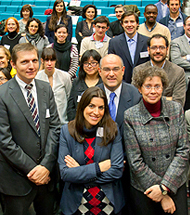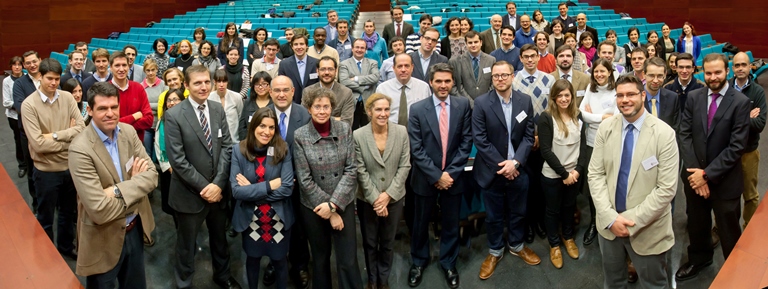2013_11_22_ICS_El conocimiento académico debe impregnar la vida social y ésta, a su vez, estimular el desarrollo científico
"The academic knowledge should permeate social life and this, in turn, should stimulate the scientific development "
Ana Marta González, scientific coordinator of the ICS at the University of Navarra, spoke at the third annual meeting of the research center

"Social innovation at research involves generating a positive feedback loop between academia and society: that the knowledge objectified in libraries leaves the academic circuits and permeates social life and that this becomes a stimulus for the scientific development ". These are the words of Ana Marta Gonzalez, scientific coordinator of the Institute for Culture and Society (ICS), on the occasion of the third Annual meeting of the research center in Humanities and social sciences of the University of Navarra, which was held under the degree scroll 'Innovation and social integration'.
Professor González referred to the new European strategy of research, Horizon 2020: "A characteristic feature of the framework program is the express desire not to separate research and social innovation. The idea behind it is to generate a more fluid transition between the academic world and society, which promotes mutual enrichment".
"The first social impact," he stressed, "is that which, starting from an interdisciplinary research of the problems, leads to improvements in the family, in civil society... that have a positive impact on the configuration of lifestyles and on the professional internship . Proposals should be aimed at promote forms of social solidarity where diversity does not inevitably translate into conflict".
For the professor of Philosophy Moral, this speech is not new to the ICS: "Since our beginnings, our scientific work has been aimed at solving social problems and building more humane societies".
Methodology and scientific rigor
For her part, the Vice President of research of the University, Iciar Astiasarán, emphasized during the opening ceremony that "in the calls for proposals from organizations that support science there is a very clear message that has been sharpened: the research gets economic support when it concludes in something beneficial for the whole of society".
"The University dreams that ICS will be its flagship to change the world, to make it see that there are values that are worth betting on. But when one deals with subjects that can be approached from different prisms, one cannot stop at opinions. To fulfill this goal there is only one way: that the opinion is supported by a series of conclusions obtained by applying methodology and scientific rigor", he pointed out.
The opening was followed by the first roundtable, moderated by Montserrat Herrero, principal investigator of project 'Religion and Civil Society'. Researchers Inés Olza (Public discourse), Alejandro García (Emotional culture and identity), Carlos Blanco (Mind-brain) and José María Torralba (Natural Law) participated.
The second round table was moderated by the main researcher of project 'Mind-brain'. Luis Ravina (Navarra Center for International Development), Carlos Centeno (ATLANTES program), Carlos Beltramo (Education of affectivity and human sexuality) and Jaume Aurell (Religion and Civil Society).

